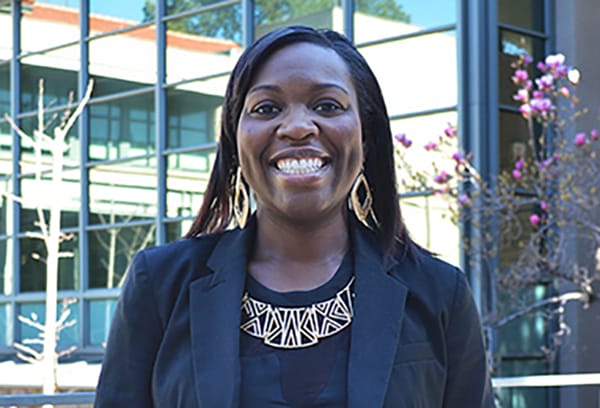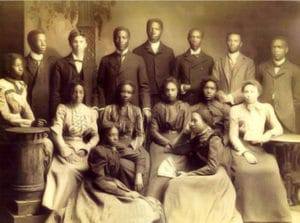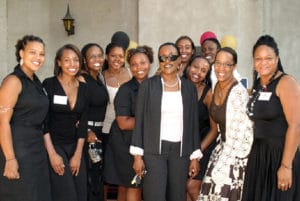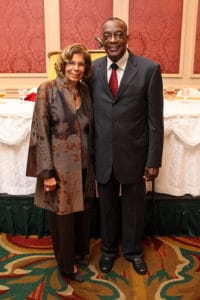Calista Kelly Launches New Fellowship

Talk to scholars and educators about the value of historically black colleges and universities and you’ll likely prompt a debate.
Some defend them as still-needed institutions that nurture intellectual and personal development for African Americans. Others question their relevance in a supposedly post-racial America.
For Calista Kelly, there is no debate. The 30-year-old PhD student in CGU’s School of Educational Studies (SES) is the product of such an institution. And she describes her undergraduate days at Paine College—one of the nation’s more than 100 historically black colleges and universities (HBCU)—in her home state of Georgia as a powerful experience.
“It really helped me gain a sense of self,” Kelly said. “Being around people who looked like me, who had the same cultural experiences as I did was strengthening.”
Her experiences have informed her efforts at CGU—and she’s paying it forward. Last year, Kelly successfully launched a fellowship that will provide financial assistance for CGUs African American students.
“My Uniqueness”
Growing up in the suburbs of Atlanta, Georgia, going to college was never in doubt, Kelly said.
“I knew I was going to go to college because my dad had gone to college. That was the only option—either that or get a job.”
Kelly ended up receiving a full scholarship to attend Paine, where she received a bachelor’s degree in English. She went on to obtain a master’s degree in English language and linguistics from Purdue University, and a master’s degree in policy, organization, and leadership studies from Stanford University.
But there was a difference between the historically black Paine and the predominantly white schools, Kelly said. At Purdue and Stanford, she said she felt “a heightened sense of my otherness, my uniqueness.”
This “difference” is the idea HBCUs were founded on.

Established in the decades following the Civil War, HBCUs ‘ “principal mission was, and is, the education of black Americans,” according to the Higher Education Act of 1965, to help offset the social and economic legacies of slavery. These institutions are credited with graduating significant numbers of engineers, teachers, and other professionals, among other accomplishments.
However, some have questioned their value, citing demographic shifts and the financial aid, enrollment, and leadership challenges that some institutions face.
From personal experience, Kelly can attest to their value. Attending a school that mirrored her racial identity provided a supportive environment.
“One of the things I got from my education is that it really cultivated my culture and my sensitivity to my culture,” she said. “It helped me to grow and have a voice and own my voice.”
“Our Struggles”
Kelly’s interests have continued to evolve throughout her education. When she was considering PhD programs, she was drawn to CGU partly because of Daryl Smith, CGU professor emerita of education and psychology, and her research into HBCUs. Initially, Kelly was interested in focusing on such institutions.
“I wanted to look at building institutional capacity at a historically black institution, specifically because I am a product of one,” she said. “For me, I know they can work more optimally than they’ve been . . . I really want to give back, particularly to my alma mater, but to those colleges in general.”
But now, Kelly’s dissertation will explore “the politics of school choice as it relates to charter schools from the perspectives of black families and school leaders.”
Her interests have also expanded outside the classroom. When Kelly began her studies at CGU in 2012, she said she felt something was amiss.

“When I got here, I didn’t feel a sense of community,” she said. “I began seeking out a number of students of color—particularly African American students—who I became friends with. We started saying we needed community, some form of advocacy group that will speak for us and help us in our struggles.”
Kelly soon discovered CGU’s Black Graduate Student Association, which had lain dormant for years. Together with other students, she held town hall-style meetings and organized a board to revive the association.
“I wanted to hear the voice of students and what they had to say about everything,” she said.
The biggest concern: financial aid.
“Ninety-nine percent of the time, that was a big issue and concern for African American students,” Kelly recalled. “I knew that was something I had to focus on.”
Her focus evolved into a fellowship.
Proactive Behavior
After identifying financial assistance as a priority, Kelly drafted a fundraising proposal and mission statement. Then she met with CGU staff—from Student Services, Advancement, and Student Life & Diversity—for help. They assisted Kelly with identifying possible donors and developing strategies to engage them by mail, telephone, and personal visits. University President Deborah Freund is assisting her with forming an advisory board for what will be known as the Black Scholars Fellowship.
Kelly herself devoted time to contact prospective donors by telephone.

Since its launch in the fall of 2014, more than $25,000 has been raised to endow the fellowship. A significant amount has come from CGU alumni, including husband and wife Matthew and Roberta Jenkins.
“[The Jenkins] said to me, ‘This has never been done before,’ and I was absolutely shocked,” Kelly said. “I was absolutely shocked to hear that this was the first time someone had ever taken initiative to do this very strategic giving. I thought this was quite interesting.”
Many have praised Kelly for her efforts.
“I applaud Calista Kelly for launching this effort even as she is in the middle of completing the PhD program,” said Gloria Willingham-Toure, a fellowship donor and CGU alumna (Phd, Education, 1996). “This is just the kind of proactive behavior that will change the world. Bravo to her.”
Dean of Student Services Lisa Flores Griffith said Kelly is making a difference.
“In the fashion of a good leader, she is also paving the way for other students to develop similar fellowships, likewise making a difference in graduate education here in Claremont,” she said.
The fellowship comes at a time when CGU has reenergized its efforts to diversify its student body.
CGU’s student body is 6 percent African American, compared to 16.4 percent international students, 13.4 Latino students, and 9.4 percent Asian.
“I saw this as an opportunity to support CGU and its diversity efforts,” Kelly said about the fellowship. “I want to make that point very clear. To me, that is very important.”
To find out more about how you can support the Black Scholars Fellowship, contact Rebecca Lerback by email at rebecca.lerback@cgu.edu or by phone at (909) 607-9229.